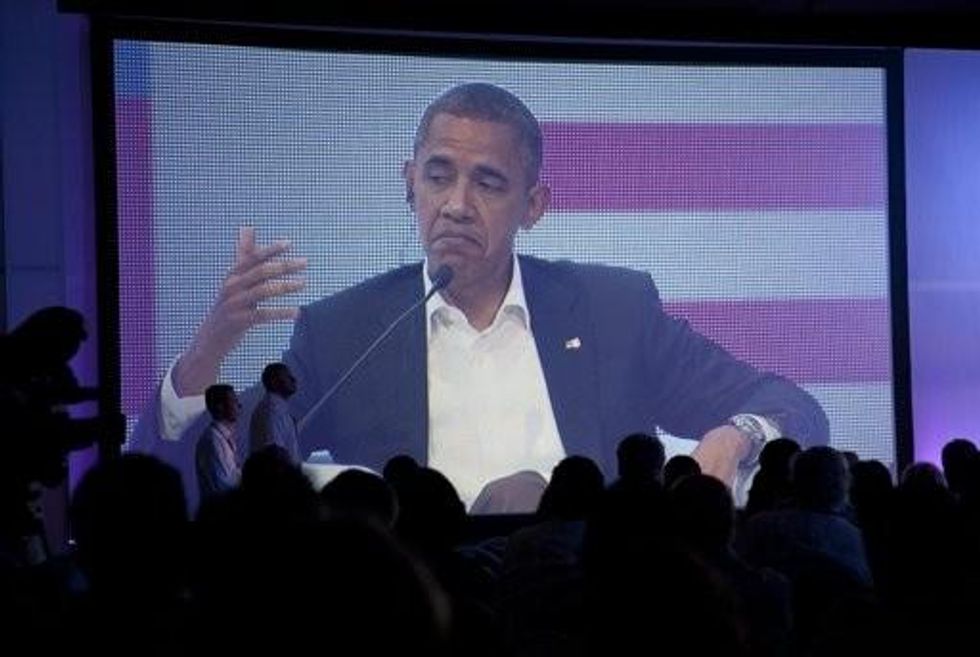President Barack Obama's re-election campaign launched its first Spanish-language ads this week, just after returning from the Summit of the Americas. He spent three days in Colombia, longer than any president in U.S. history. The trip was marred, however, by a prostitution scandal involving the U.S. military and Secret Service. Gen. Martin Dempsey, chair of the U.S. Joint Chiefs of Staff, said, "We let the boss down, because nobody's talking about what went on in Colombia other than this incident." Dempsey is right. It also served as a metaphor for the U.S government's ongoing treatment of Latin America.
The scandal reportedly involves 11 members of the U.S. Secret Service and five members of the U.S. Army Special Forces, who allegedly met prostitutes at one or more bars in Cartagena and took up to 20 of the women back to their hotel, some of whom may have been minors. This all deserves thorough investigation, but so do the policy positions that Obama promoted while in Cartagena.
First, the war on drugs. Obama stated at the summit, "I, personally, and my administration's position is that legalization is not the answer." Ethan Nadelmann, founder and executive director of the Drug Policy Alliance, told me that, despite Obama's predictable line, this summit showed "the transformation of the regional and global dialogue around drug policy. ... This is the first you've had a president saying that we're willing to look at the possibility that U.S. drug policies are doing more harm than good in some parts of the world." He credits the growing consensus across the political spectrum in Latin America, from key former presidents like Vicente Fox of Mexico, who supports legalization of drugs, to current leaders like Mexico's Felipe Calderon, who cited the rapacious demand for drugs in the U.S. as the core of the problem.
Nadelmann went on: "You have the funny situation of Evo Morales, the leftist leader of Bolivia, former head of the coca growers' union, lecturing the United States about--essentially, sounding like Milton Friedman--that 'How can you expect us to reduce the supply when there is a demand?' So there's the beginning of a change here. I don't think it's going to be possible to put this genie back in the bottle."
"The two main pillars of U.S. foreign policy--increasing neoliberalism and increasing militarism around drugs--continue. They feed off of each other and have created a crisis in that corridor, running from Colombia through Central America to Mexico. That's been a complete disaster, and there's no change." - Greg Grandin
Then there is trade. Obama and Colombian President Juan Manuel Santos also announced that the U.S.-Colombian Free Trade Agreement would take full force May 15. Colombian and U.S. labor leaders decried the move, since Colombia is the worst country on Earth for trade unionists. Labor organizers are regularly murdered in Colombia, with at least 34 killed in the past year and a half. When Obama was first running for president, he promised to oppose the Colombia FTA, "because the violence against unions in Colombia would make a mockery of the very labor protections that we have insisted be included in these kinds of agreements." That year, 54 Colombian trade unionists were killed. AFL-CIO President Richard Trumka said the announcement "is deeply disappointing and troubling." Republicans, on the other hand, are offering grudging praise to Obama for pushing the FTA.
On Cuba, Obama took the globally unpopular position of defending the U.S. embargo. Even at home, polls show that a strong majority of the American people and businesses support an end to the embargo. The U.S. also succeeded, once again, in banning Cuba from the summit, prompting Ecuadorian President Rafael Correa to boycott the meeting this year.
Responding to overall U.S. intransigence, other Western Hemisphere countries are organizing themselves. Greg Grandin, professor of Latin American history at New York University, told me: "Latin Americans themselves are creating these bodies that are excluding the United States, that are deepening integration, political and economic integration. This seems to be a venue in which they come together in order to criticize Washington, quite effectively."
Grandin compared Obama's Latin America policies to those of his predecessors: "The two main pillars of U.S. foreign policy--increasing neoliberalism and increasing militarism around drugs--continue. They feed off of each other and have created a crisis in that corridor, running from Colombia through Central America to Mexico. That's been a complete disaster, and there's no change."
It will take more than a prostitution scandal to cover that up.
Denis Moynihan contributed research to this column.

